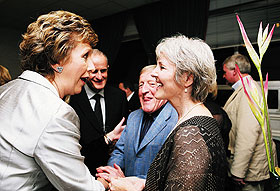  |
| HOME | THIS ISSUE | CALENDAR | PATENTS | BACK ISSUES | < BACK | NEXT > |
As Fulbright Scholar, dramatic arts professor directs opera in Irelandby Sherry Fisher - March 30, 2009
|
||||
| When Karen Ryker was invited to direct a production of Mozart’s The Magic Flute at the Dublin Institute of Technology, she jumped at the chance. “There was a natural crossover in technique from my previous experience of directing theatrical productions,” says Ryker, a professor of dramatic arts in the School of Fine Arts who teaches speaking voice and acting. “I also thought it would be a wonderful opportunity to investigate the intersections of drama and music, bring acting techniques to the opera singers, and help prepare them for their future careers.” Ryker spent a semester in Ireland as a Fulbright Scholar, working with Irish conductor William Halpin at the Institute’s Conservatory of Music and Drama. She first met Halpin when he was working on his doctorate in music at UConn. In Ireland, in addition to directing the opera, Ryker also taught acting classes. Directing a Mozart production was “like falling off a log into really warm water,” Ryker says . “Mozart is a lot like Shakespeare. He tells you exactly how to stage a performance. His music simply says: ‘This is a light, airy moment. This is the time to pull out the dagger. This is when she falls.’ It’s all right there in the music.” But opera students aren’t necessarily trained to think about these things, she says. They have other concerns: “They’re learning a craft and trying hard to get it all right. They’re focusing on, for instance, the rib carriage they need, the way they have to open their mouths and lengthen their spines and produce a sound that has just the right amount of tremolo. How can they possibly think about what the music is telling them about acting? “It takes a certain amount of experience, and that’s what they’re here to get,” she says. “I try to point their ears to it – just like a teacher would do in a music appreciation course. I’ll say, ‘Listen to this run. Listen to this crescendo. How does it make you feel? What is your goal in that moment? What do you do to accomplish your goal?’ I ask them these questions in spite of everything else they have to do.” Ryker says the technique paid off. “The more they focused on what the music was telling them and on their objectives … the more easily their sounds fell into place.” During one of the first rehearsals she had with the chorus, they were supposed to be joyous.
“The emotion just wasn’t coming from them,” says Ryker, “so I tried to relate what they were singing about to their personal lives. I spoke of World War II, tickertape parades, and soldiers coming back home. “I talked about how people thought that evil would be victorious,” she says. “I also talked about the evil we fear today. What if we are afraid of being plunged into a destroyed world, and then suddenly we come into a moment of light … and the good people win!” When the chorus sang the piece again, there was a big difference, Ryker says: “They sang from their hearts.” Opera has changed over the last two decades, according to Ryker. “Today, there are more directors of stage and film directing operas,” she says. “They expect that singers will know how to act. Opera singers not only have to inhabit their roles in a much more full way, but they might also be asked to sing while flying through the air on a trapeze. These physical demands were not placed on opera singers years ago.” She notes that at UConn there is a focus on greater collaboration between the music and dramatic arts departments, “because our acting students need to be able to sing, and our students in voice training need to be able to act.” Before heading to Ireland, Ryker spent almost two years preparing for the project. “The project was definitely a collaborative effort with lots of e-mailing, faxing, and Skype [Internet telephone] conference calls across the Atlantic,” she says. She worked with a team that included Halpin’s son, Baz Halpin, who created the lighting and scenic design, and a costume designer, Nell Knudsen, in London. She also spent a week at the Lincoln Center for the Performing Arts library, where she reviewed recorded productions of The Magic Flute. The production was very well received by the Irish public and press, Ryker says. Audiences included the president of Ireland and several ambassadors. |
| ADVANCE HOME UCONN HOME |

